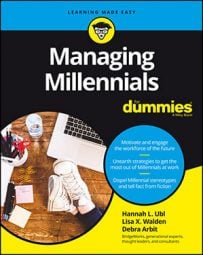- Mix the formal with the informal. Classroom-style training and/or clicking through e-Learning program after program isn’t going to do the trick. Mix this type of training with more informal styles — say, a lunch and learn — with other employees in the same role or the role above theirs, who can fill them in on the organization’s unwritten rules. Bonus: Cater in unique food from a local favorite restaurant.
- Keep training interactive and experiential. Ditch the traditional training manual. Millennials will no doubt assign it the TL;DR (too long; didn’t read) acronym. Build real-time, live practice training whenever possible. Contrary to popular belief, Millennials — and especially the next generation — actually favor in-person training. They live most of their lives in a virtual world and savor the opportunities to step outside of it where everyone can learn at a similar place and experience the edutainment together.
- Use team-based learning when possible. Some organizations put groups of hires through Training 101 courses, where they “graduate” together as a team or present at milestones after a job rotation. This is a great way to build connections among new hires. Again, this won’t always be possible — but when you can use team-based programs, you start building those invisible bonds that become natural venues for the Millennial collaboration that is so sought after.
- Keep tweet-sized top of mind. Don’t overload your new Millennial hire with all the information he could ever need on that first day or week. Space it out. Remember, Millennials are a generation used to consuming bits of information. When you make it bite-sized, they’ll share the best of the information with their peers. Great training deserves to be discussed, even if it’s in a list of “the ten things I learned in my training.”
- Teach the basics. Don’t assume that the new hire will know all the professional ins and outs on day 1 — or day 500. Topics like formality of dress, how to write an email, and when it’s okay to reach out to leadership (and when it’s definitely not) should all be covered in your training. The written and unwritten rules change over time, and you have the opportunity to create a safe zone of honest conversation in trainings. Maybe something will come up that they can even work through together! (Subdue the “Kumbaya” groan if you feel it coming on.)
- Assign them a training buddy. You’re not going to want to be the one answering all the questions that will undoubtedly bubble up to the surface as they learn the details of their job. Give them a buddy to lean on who can help them along the way or serve as an extra support as they both navigate your training program together.
- Give them training options. Most learning and development departments have a library of training they roll out to their workforces. This element of customization is especially appealing to the generation that masterfully filters through information. Much like choosing courses in college, Millennials will turn to each other to see who is going to what and when — get ready to see increased attendance and chatter if there’s a fun list of trainings to choose from and attend.
Effective training is about more than just teaching skills. It’s teaching your employees the tools they need to succeed in your organization. Some of those are very concrete and tactical, like understanding who to call for purchase orders or how to use the printer. Others are more intangible and strategic, like building lines of communication among employees who want so badly to connect and collaborate with one another.

